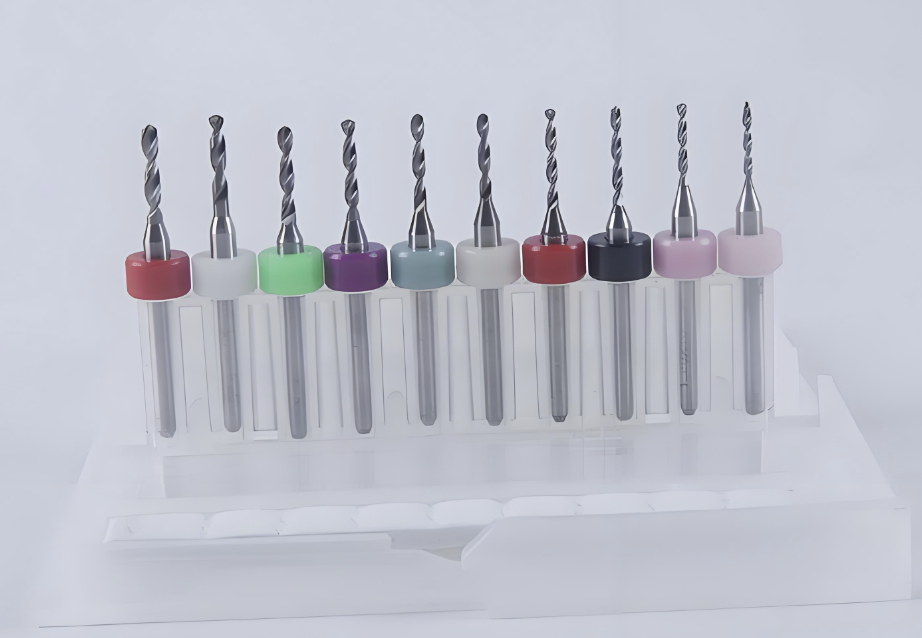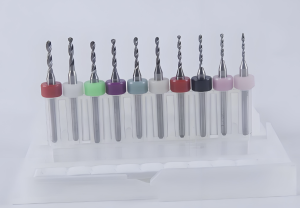
PCB drill bits are essential tools in the production of printed circuit boards (PCBs). These specialized bits are designed to drill precise holes in the PCB, allowing for component placement, vias, and other electrical connections. In this article, we will explore the different types of PCB drill bits, how they are used in manufacturing, and the best practices for selecting and maintaining them to ensure high-quality results in your PCB production process.

PCB Drill Bits
PCB Drill Bits
PCB drill bits are cutting tools used to create holes in printed circuit boards. These holes are necessary for various components, including through-hole components, vias, and soldering pads. PCB drill bits are designed specifically to handle the demands of drilling through materials such as FR4, metal, and other common PCB substrates.
But here’s the kicker: PCB drill bits aren’t your typical drills. They must be incredibly precise, durable, and designed to withstand the harsh conditions of high-speed automated machinery. This precision ensures that the PCB performs well in its final application, whether it’s for consumer electronics, automotive components, or medical devices.
PCB drill bits come in various sizes and types, each suited to specific drilling needs. They are often made from materials such as solid carbide, high-speed steel (HSS), or cobalt, each providing varying levels of durability and performance for different applications. The right drill bit choice can have a significant impact on the overall quality and reliability of the PCB.
| Material | Characteristics | Common Use Cases |
|---|---|---|
| Solid Carbide | High hardness, wear resistance, and durability | High-precision drilling, long-lasting performance |
| High-Speed Steel (HSS) | Good balance of toughness and cost-efficiency | General-purpose drilling in less demanding applications |
| Cobalt | Tough, heat-resistant material | Drilling through tough materials and high-volume production |
There are various types of PCB drill bits designed for different applications. Each type is suited to specific drilling requirements, depending on the materials, precision, and hole size needed for the PCB.
What’s the real story? Choosing the right drill bit for your PCB production can drastically affect the efficiency of the manufacturing process and the quality of the final product. Below are the most common types of PCB drill bits:
| Drill Bit Type | Characteristics | Best Use Case |
|---|---|---|
| Solid Carbide | High precision, wear-resistant, durable | High-speed, high-precision applications |
| Cobalt | Tough, heat-resistant, strong | Drilling through tough materials or high-volume production |
| High-Speed Steel (HSS) | Cost-effective, versatile | General-purpose drilling, low- to mid-range production |
| Micro Drill Bits | Extremely small sizes, made of solid carbide | Micro vias, fine-pitch PCBs, high-density designs |
Selecting the right PCB drill bit is vital for ensuring precision, extending tool life, and maintaining the quality of the final product. Here are some key factors to consider:
What’s the real story?
Choosing the right drill bit isn’t just about picking the sharpest tool. It’s about matching the material, size, and type of drill bit with the specific requirements of your PCB design.
Key Factors to Consider:
Material of the PCB: Different PCB materials require different drill bits. For example, FR4 is typically drilled with carbide bits, while tougher materials like metal or copper may require cobalt or HSS drill bits.
Hole Size and Precision: The size of the hole required plays a significant role in determining the drill bit needed. Micro drill bits are used for small holes, while larger holes may require a solid carbide or cobalt bit for better durability.
Production Volume: If working with a high-volume production run, investing in higher-end drill bits, such as solid carbide or cobalt, which last longer and can withstand high-speed drilling, is beneficial.
Speed of Drilling: Some drill bits are designed for high-speed drilling, while others are made for slower, more precise drilling tasks. Match the drill bit to the speed requirements of your manufacturing setup.
Table 3: Key Factors for Choosing PCB Drill Bits
| Factor | Description | Considerations |
|---|---|---|
| PCB Material | Material type of the PCB | Choose the drill bit material based on PCB material |
| Hole Size | Size of the holes to be drilled | Micro drill bits for small holes, larger bits for bigger holes |
| Production Volume | Scale of the production run | Solid carbide or cobalt for high-volume production |
| Drilling Speed | Required drilling speed | Solid carbide for high-speed drilling |
PCB drilling techniques vary based on the complexity and requirements of the design. These techniques are essential for producing boards that meet the specifications for high-speed performance and reliability.
This is where it gets interesting: The drilling process must accommodate different hole types, such as through-holes, blind holes, and micro vias. Each of these types of holes requires specific drilling techniques and tools to ensure accuracy.
Through-Hole Drilling:
Through-hole drilling involves creating holes that pass through the entire PCB. This is the most common type of drilling used for component placement and electrical connections between different layers of the PCB.
Blind Hole Drilling:
Blind hole drilling creates holes that don’t pass through the entire board. These holes connect one layer of the PCB to an internal layer. Blind hole drilling requires precise control to avoid damaging the surface layer.
Micro Drilling:
Micro drilling creates extremely small holes, typically for micro vias. These holes are crucial for high-density interconnects (HDI) and are used in advanced PCB designs where space is at a premium.
Table 4: Comparison of PCB Drilling Techniques
| Drilling Technique | Description | Use Case |
|---|---|---|
| Through-Hole | Drills holes through the entire PCB | Standard for component placement and connections |
| Blind Hole | Drills holes that don’t pass through the board | Used for connecting internal layers in multilayer boards |
| Micro Drilling | Drills very small holes for fine-pitch designs | Used for micro vias, HDI PCBs, and compact designs |
The size of the drill bit used plays a significant role in the precision and efficiency of the drilling process. The choice of drill bit size affects the final performance of the PCB as well as the speed and cost of production.
What’s the real story?
Drill bit size is critical when it comes to high-precision PCB manufacturing. Smaller bits are used for intricate designs, like fine-pitch components, while larger bits are required for standard vias and through-holes. The right drill bit size ensures that holes are drilled accurately, without compromising the strength or performance of the PCB.
Small Drill Bits:
Small drill bits, typically in the range of 0.2mm to 1.0mm, are used for fine-pitch components and micro vias. These bits require precision and care during the drilling process to avoid damage to the PCB or misalignment of holes.
Larger Drill Bits:
Larger drill bits are used for through-holes and larger vias. These bits are designed for strength and durability to handle high-speed drilling without wearing out quickly.
Table 5: Drill Bit Size and Applications
| Drill Bit Size | Application | Suitable For |
|---|---|---|
| Small Drill Bits | Used for micro vias and fine-pitch components | High-density PCB designs, HDI boards |
| Larger Drill Bits | Used for through-holes and larger vias | Standard component placement and general PCB fabrication |
Maintaining your PCB drill bits is essential to prolonging their lifespan and ensuring consistent performance. Proper care of drill bits can help avoid downtime, reduce defects, and maintain the quality of your PCB manufacturing process.
Ready for the good part? By following proper maintenance practices, you can extend the life of your drill bits, optimize your manufacturing process, and save money in the long run. Here are some key maintenance tips:
| Maintenance Tip | Description | Benefit |
|---|---|---|
| Cleaning | Clean after each use to remove debris | Prevents clogging and extends bit lifespan |
| Inspection | Regularly inspect for wear and tear | Identifies when replacement is necessary |
| Storage | Store in a dry, clean environment | Prevents damage from corrosion and prolongs life |
Choosing the right PCB drill bit is critical to ensuring the quality and performance of your PCBs. From selecting the appropriate material to choosing the right drill bit size, each decision impacts the overall quality and efficiency of your manufacturing process. By following best practices in drill bit selection, maintenance, and care, you can optimize production and ensure the reliability of your PCBs.
Q1: What are PCB drill bits?
PCB drill bits are specialized cutting tools used to drill holes in printed circuit boards for component placement, vias, and other electrical connections.
Q2: How do I choose the right PCB drill bit?
Consider factors such as the material of the PCB, hole size, and the specific application to select the appropriate drill bit for your production needs.
Q3: What are the different types of PCB drill bits?
The most common types include solid carbide, cobalt, high-speed steel (HSS), and micro drill bits, each suited to different materials and applications.
Q4: How do I maintain PCB drill bits?
Clean drill bits after use, inspect for wear, and store them in a clean, dry place to extend their lifespan and maintain their performance.
Q5: Why is drill bit size important in PCB manufacturing?
Drill bit size determines the precision of the holes and impacts the drilling speed and cost, especially in high-density or micro via designs.
At SQPCB, we understand the importance of precision and durability in the PCB manufacturing process. With over 80 six-axis drilling machines and a commitment to using the highest quality drill bits, we ensure that every board is manufactured with the utmost care and attention to detail. From high-volume production to intricate designs, SQPCB offers unparalleled expertise in delivering high-quality PCBs on time and within budget.
Connect to a Jerico Multilayer PCB engineer to support your project!
Request A Quote